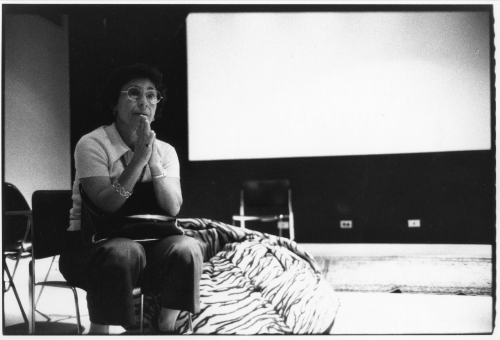The Filmmaker: Miriam Arsham
Tough and sweet, demanding and nurturing, Professor Emerita of Film Miriam Arsham taught a generation of Purchase film students the art of telling stories through moving images.
Her eye for detail and knack for explaining the intricacies of film editing provided lifelong lessons to Wedge and Hartley, who have rallied Purchase alumni to support an endowed scholarship in Arsham’s name.
“Mimi encouraged us to explore outside of our expectations, and to cut film to make a story that might not have been there in the first place,” says Wedge, who directed Blue Sky Studio’s 2002 hit, Ice Age, and produced its sequels. “I came out of Purchase having learned how to think, with ways to deal with the face of changing technology and the shifting expectations from film.”
Wedge supported the scholarship program to honor his mentor and give back to the next generation of Purchase filmmakers who need help to afford the four-year BFA program in the School of Film and Media Studies.
“The scholarship is for students who show promise, but come from demanding circumstances,” says Wedge. “This will give them a shot.”

Professor of Film Iris Cahn ’76, who studied under Arsham, recalled how students grew to appreciate the many sides of the diminutive woman with a tough exterior and a huge heart.
“She was a little powerhouse of a woman,” says Cahn. “Having worked in film with men, she’d developed a kind of toughness. But once you worked with her, as a student or collaborator, you learned how all-in and nurturing she was. She wanted you to make the film you wanted to make.”
Founding professor and film historian Thomas Gunning recalls his colleague’s vibrant spirit.
“She had great energy, insight, and sense of humor,” says Gunning, retired professor emeritus of film at the University of Chicago. “When she got wound up, I got out of the way.”
Hartley, who joined with Wedge to launch the endowment, said that Arsham provided insight on many levels. She taught students how to manipulate the huge machines that were used then to edit film, impressing upon them the need to work systemically in the editing room to bring their creative vision to reality. She was steeped in the history of film and infused her classes with her broader knowledge of history, the arts, and literature.
“She opened up the world to us,” says Hartley. “There was always a fluid give-and-take with Mimi about what was good editing. She’d ask why you’d cut a scene in a particular way. You had to be sure you knew what you were doing. And she taught us ways to talk about it.”
Arsham worked as a film editor (IATSE) with many directors in the U.S. and Europe on documentaries and was a close friend of and assistant to influential director and avant garde filmmaker Maya Deren in the 1940s and 1950s. Her filmography includes Martha Graham: Dance on Film; the Academy Award–winning The Eleanor Roosevelt Story, directed by Richard Kaplan (1965); The Guns of August (1964) and Jascha Heifetz Master Classes, directed by Nathan Kroll (1962); and Night Journey, the film of Martha Graham’s ballet, directed by Alexander Hammid (1960).
Written by David McKay Wilson